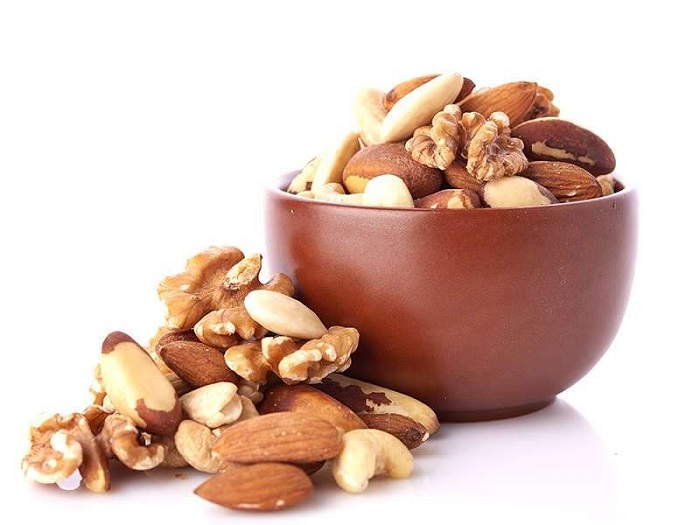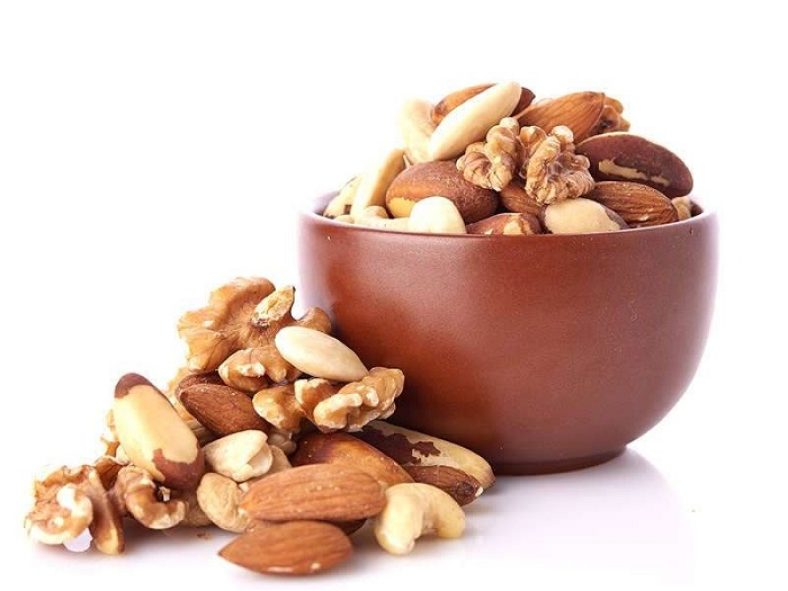With its high nutritional value, eco-friendliness, and gentleness, nut milk has become a preferred choice for many parents considering its usage for their children. However, does drinking nut milk contribute to increased height, especially when cow’s milk is widely known for its role in height and weight improvement? Let’s delve into this topic in the following article by Grow Taller Solutions.

What is nut milk?
Nut milk is a beverage made from grains and various natural nuts, the most common being soy milk, almond milk, walnut milk, peanut milk, and more. Nut milk originates from Spain and has been around for several centuries.
Nut milk is usually categorized into two groups:
– Nut milk rich in fats and proteins: This group includes milk made from nuts containing high levels of fats and proteins such as walnuts, almonds, various types of beans, etc.
– Nut milk from grains: This type of milk is made from various grains like oats, brown rice, corn, sweet potatoes, among others.
The nutritional value of nut milk doesn’t vary significantly when compared to the nuts used in its production. Currently, nut milk is gaining popularity among consumers due to its nutritional value, eco-friendliness, low allergenicity, and environmental friendliness.
What are the nutritional components of nut milk?
The nutritional composition of nut milk varies depending on the type of nut used in its production. However, most types of nut milk contain the following nutrients:
– Carbohydrates: Comprising 15-45% of the nutritional content, providing sustained energy for bodily activities.
– Proteins: Protein content in nut milk is relatively high, ranging from 7-35%, especially in soy milk, which contains most essential amino acids beneficial for effective health care.
– Fats: Nut milk has a relatively high fat content, particularly containing non-saturated fatty acids like omega-3, omega-6, omega-9.
– Fiber: Nut milk contains a high amount of fiber compared to animal milk. Fiber is beneficial for the digestive system, doesn’t contribute to weight gain, and provides a prolonged feeling of fullness.
– Vitamins and minerals: Nut milk varieties offer a diverse range of vitamins and minerals like calcium, magnesium, zinc, iron, potassium, supporting various bodily functions effectively without providing energy.
– Antioxidants: Nut milk contains various antioxidants such as Phenolics, Luteolin, Tocotrienols, Flavonoids, which are beneficial for cardiovascular health and slow down the aging process.
What are the benefits of nut milk?
Nut milk offers various health benefits for humans:
Nutritional supplementation
Drinking nut milk provides the body with essential nutrients such as fiber, vitamins, minerals like magnesium, calcium, potassium, omega-6 fatty acids, boosting the immune system, and reducing the risk of diseases. The high protein content in nut milk also provides energy for efficient bodily functions.
Cardiovascular protection
All types of nut milk contain vitamin E, fiber, and omega-3 fatty acids, which reduce cholesterol levels, maintain healthy blood vessels, and decrease the risk of heart diseases. Therefore, incorporating nut milk into a daily routine is beneficial, especially for older individuals or those with hypertension and cardiovascular conditions.
Eye care
The antioxidants Lutein and zeaxanthin in nut milk contribute to healthy eyes, protecting them from oxidative damage.
Digestive support
Nut milk, being lactose-free, reduces the risk of digestive issues such as indigestion, stomach pain, and frequent diarrhea often associated with consuming animal milk. The abundant fiber in nut milk aids smooth digestive functioning.
Low calorie content
Compared to animal milk, nut milk contains fewer calories. For instance, 100ml of soy milk contains about 26 calories, whereas the same amount of cow’s milk contains up to 63 calories. Additionally, drinking nut milk provides a prolonged feeling of fullness, reduces cravings, and assists in maintaining a balanced and slender figure.
Skin care
Most types of nut milk provide a significant amount of Copper, aiding in regulating the production of skin proteins like collagen and elastin, which helps prevent skin aging. Consumption of nut milk contributes to anti-aging support, toxin removal, and maintains youthful and healthy skin.
Does drinking nut milk contribute to increased height?
With its nutritional value and the aforementioned benefits, various types of nut milk might have already convinced you of their advantages. However, another benefit of nut milk that hasn’t been discussed is its potential contribution to increased height.
With a diverse mineral composition essential for bone structure such as calcium, magnesium, potassium, zinc, iron, nut milk supports stronger and more flexible bones, stimulating good bone growth and robust height development.
The high protein content in nut milk provides energy for efficient bodily functions. Abundant fiber supports optimal digestive functioning, enhancing the body’s nutrient absorption capacity. Drinking nut milk contributes to weight management, reducing the risk of obesity. An ideal weight also favors maximal height development.
Therefore, you can absolutely use nut milk to aid in height growth. Supplementing with approximately 300-500ml of nut milk daily provides essential nutrients that support reaching full height potential.
Which types of nut milk effectively contribute to increased height?
Soy Milk
This is the most familiar type of nut milk, rich in fats and proteins. Almost everyone can consume soy milk, making it safe for all age groups. Soy contains nutrients similar to female estrogen hormone, aiding in softer, smoother skin and reducing common discomforts in women.
Corn Milk
Originating from the Americas, corn milk is prepared from corn kernels. It has a rich, fragrant taste, devoid of cholesterol, making it very beneficial for health. Corn milk possesses anti-aging properties, is energy-rich, and supports height development.
Almond Milk
Almond milk is highly favored by many in the United States. It boasts high nutritional value with abundant vitamins and minerals. However, the fiber content in almond milk significantly decreases during processing and dilution.
Walnut Milk
Walnuts are considered the king of nuts due to their richness in omega-3, antioxidants, vitamins, suitable for almost all ages. Walnut milk, like other nut milk types, is safer for individuals allergic to animal milk. Key nutrients in walnut milk include protein, Vitamin B, Vitamin C, Vitamin E, with relatively low glycemic index.
Lotus Seed Milk
Made from ground lotus seeds, it’s rich in protein, potassium, phosphorus, with low saturated fat and cholesterol content. This milk is beneficial for natural physical growth and safe for health.
Red Bean Milk, Green Bean Milk
Red and green bean milks are lauded for their cardiovascular benefits due to their richness in magnesium, folate, potassium, Vitamin B, and fiber. They are also excellent choices for individuals with diabetes.
Peanut Milk
Peanut milk has a distinctive creamy taste, excellent for cardiovascular health. It contains high levels of protein and beneficial minerals for bone health like calcium, magnesium, phosphorus, potassium. Drinking 1-2 cups of peanut milk daily can effectively supplement nutrients for height development.
Oat Milk
Oat milk is rich in Vitamin A, Vitamin B6, Vitamin B12, ideal for dieters, weight management, providing energy for effective learning and work. It also contains significant minerals such as calcium, magnesium, potassium.
Considerations for height increase when supplementing with nut milk
While utilizing nut milk to increase height, it’s crucial to note the following:
– Avoid excessive intake of nut milk; supplement in moderate quantities.
– Overconsumption of nut milk may inhibit iron absorption.
– Maintain a daily nut milk consumption routine.
– Substitute animal milk with nut milk or combine both types for optimal height growth.
– Children above 1 year old can consume nut milk.
– Homemade nut milk is an economical choice over store-bought options.
– Ensure a balanced and diverse diet to support good height growth.
– Engage in regular physical exercise.
– Get sufficient and early sleep daily.
– Consider using nutritional supplements (functional foods or height-enhancing medications) to enhance nutrient intake for optimal height growth.
Nut milk offers high nutritional value and is beneficial for natural height development. Therefore, if you’re still concerned about whether drinking nut milk contributes to increased height, start consuming nut milk now. This practice benefits your health while promoting your full height potential.
FAQs
Does almond milk increase height?
Almond milk, like other types of milk, does not directly contribute to increasing a person’s height. Height is primarily determined by genetics and various environmental factors during growth stages. Almond milk is a source of nutrients like calcium and vitamin D, which are beneficial for bone health, but it doesn’t have a specific effect on height increase.
Which milk is best for height growth?
No specific type of milk is directly linked to height growth. However, milk, including options like cow’s milk, almond milk, soy milk, etc., contains essential nutrients like calcium and vitamin D, which are important for bone development and overall health. Consuming a balanced diet and adequate nutrition from various sources, including milk, can support healthy growth during childhood and adolescence.
How many almonds should I eat a day to increase height?
There isn’t a specific number of almonds that can guarantee an increase in height. Almonds are nutritious and contain various essential nutrients, including vitamin E, magnesium, and healthy fats. However, no scientific evidence suggests that consuming almonds in a specific quantity leads to height increase. A handful of almonds (about 1 ounce or 23 almonds) can be a healthy addition to your diet, but solely relying on almonds for height growth wouldn’t be effective. A balanced diet, regular exercise, and overall good health habits are more impactful for proper growth and development.
- See More: Grow Taller Solutions
